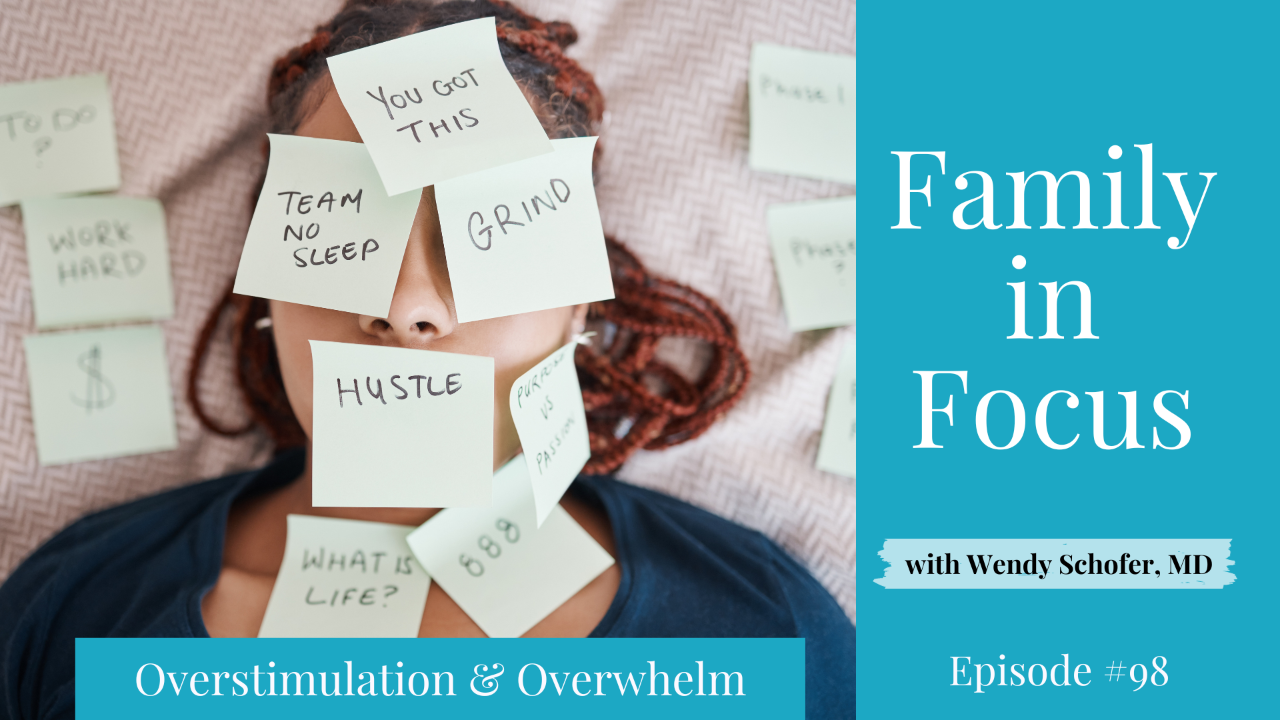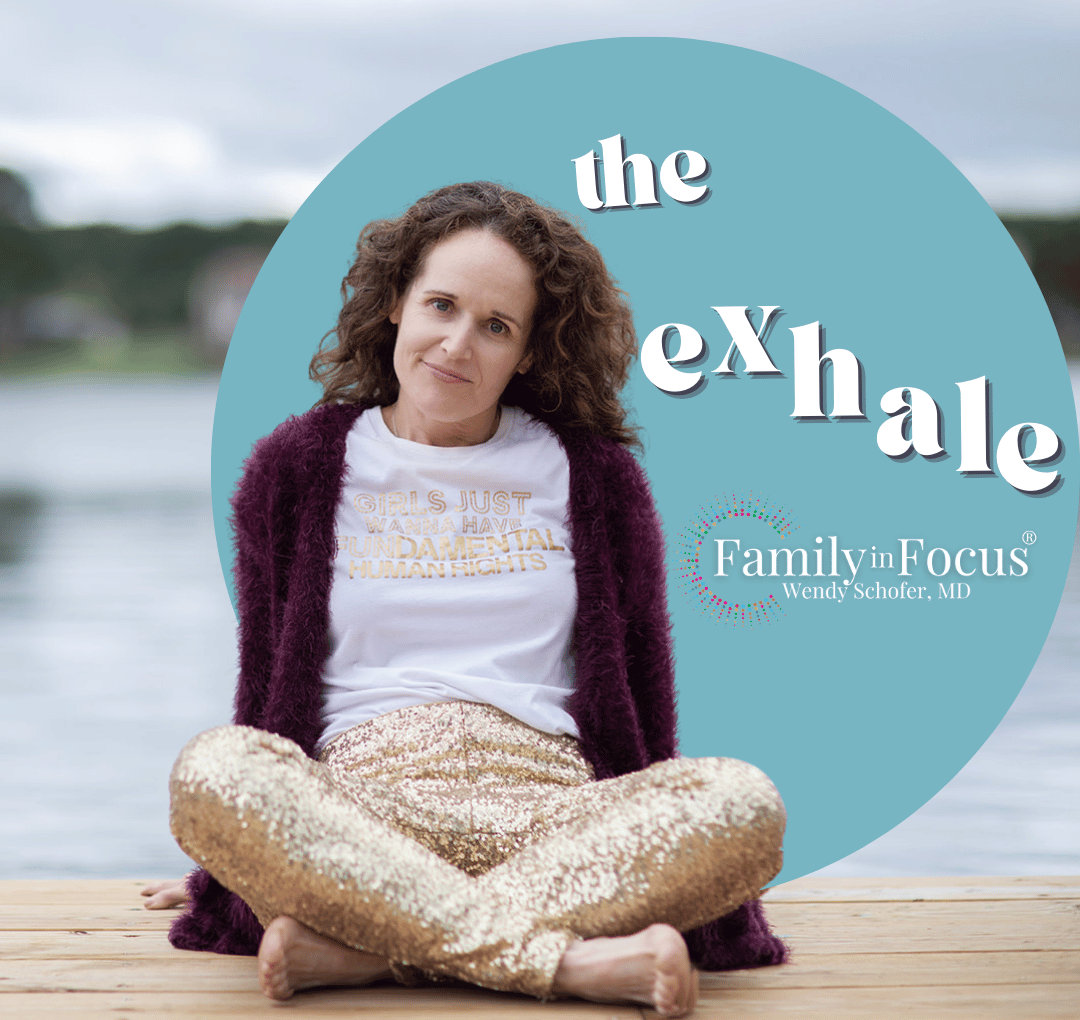
I’ve spoken with parents about overstimulation for many years. It’s a common occurrence for kids at parties, the rush of holiday presents (think about the kid who just wants to enjoy the present they have and others are trying to get them to move on to open the next gift), and for children experiencing neurodiversity.
I’m here to say loud and clear: we are all experiencing overstimulation.
There’s nothing wrong with the brain of the child who is experiencing overstimulation.
We don’t have to hunt for a diagnosis. To be honest, we ALL have neurodiversity - meaning our brains are all working in various ways. There is no right, no normal, no wrong or abnormal. And diversity does not mean broken or needing to be fixed.
What needs to be fixed is our environment.
For our purposes, this is how I’m defining overstimulation and overwhelm:
Stimulation is what we are receiving from our environment. Over-stimulation is when it is more than we can process or juggle or tolerate. And overwhelm is the emotional experience of having more than one can process or juggle or tolerate at a time. Overwhelm is the internal, emotional experience of the external overstimulation.
OK - let’s go back to the story.
When have you felt overwhelmed? Think of a particular time.
For me, overwhelm is something that I know very well. It’s a feeling of having too much, too quickly, I can’t juggle it all, I continuously try to switch channels in my brain (computer-kids-phone-colleagues-need to pee-crying-hungry).
The part I want to highlight: too much, too quickly – that is what happens in trauma. The nervous system is overwhelmed with whatever is going on and can lead to carrying the wounds into the future.
Not all overwhelm is leading to trauma and yet… it’s still too much, too quickly and a place where we have a neurologic response: fight, flight, freeze or meltdown.
It happened to me last week. My husband invited me to go to a concert with him. I thought briefly about taking headphones as I am sensitive to noises and then I forgot about them in the hubbub of going out on a date night.
When the concert started my head started pounding. The sounds, the lights… I went to the bathroom and made makeshift earplugs with toilet paper. Spoiler: that is completely ineffective.
I went back to join my husband. I felt a barrage of lights, lasers pointing out at the crowd, piercing my soul, and noises so loud and freaky.
Everyone else around me was having the time of their lives.
And I felt nauseated.
And yet, I froze there. I closed my eyes. I swallowed repeatedly to try to figure out how to protect my ears.
When I started to tear up, I told my husband I’d meet him outside.
The tears came when I found myself in the entryway, much quieter - not quiet, but I could actually hear the words of the songs, not just the loud clanging and banging. My nausea decreased.
I thought of my child who has learned to wear headphones when in crowds. Neurodiversity was the explanation for needing the headphones: they helped decrease the stimulation.
But with that night, I had a few options: behind Door #1 was to think about what was wrong with me, where am I on a spectrum of diagnoses, and behind Door #2 was learning about what I needed (and didn’t need). I chose to see that it’s not about looking at what’s wrong with me – because I firmly believe there is nothing wrong with me and most definitely not with my child. Something “wrong” means that it needs to be fixed. No, we are just learning how their brain works.
Period.
It is totally working. What isn’t working is the environment that we are putting our brains and bodies into.
This environment is f’d up. There is just collectively too much stimulation. I notice it in particular when I step out of the day-to-day for just a moment. When I go overseas and then return home, I am inevitably overwhelmed when I go to our grocery stores: so many options, colors, smells, brands demanding attention. When I go out to eat after enjoying peace at home, I am bombarded by the volume of the music in restaurants.
There are sounds and smells and colors and lights and voices and…. All of it. EVerywhere.
What do we do?
Here is my practice:
1. Notice. Yeah, it feels bad to notice overwhelm - and it is liberating to call it out. This is overwhelm. Pause there. Feel it. Where is it in your body? I feel it more often than not as a spinning in my head (well before the nausea comes in). Take one deep breath and let it out slowly.
2. There is nothing wrong with me. This is an active process of not judging, and welcoming compassion because it sets me up for the next step.
3. What do I need right now? Hon, what do you need? Check in with your body, ask what is needed. Is it to close your eyes and take another deep, slow breath? (BTW that activates the vagus nerve and is a primo way of calming the nervous system - I use it on the regular and teach it to my kids and clients to disrupt the pattern that is bombarding the nervous system.) What is one step, just one step you can take to provide what is needed? Is it a step outside? Is it to choose what YOU want to focus on, just one thing at a time? Is it to bathe yourself in quiet and stillness?
4. Breathe. EVen before finding myself in moments of overwhelm, I practice finding and creating quiet, enriching moments. This is creating a practice - doing the reps ahead of time so that during “game time,” when stuff is really hitting the fan and I’m feeling stressed or overwhelmed, I can turn to the practice of taking a deep breath. I know how it feels ah-mazing and will be there when I need it.
5. Notice the desire to turn to electronics - we think they will help, but they just distract and stimulate in another way. They numb/comfort/distract, but not actually getting to the neurologic de-stimulation we need to offer healing.
6. Question the assumption that overstimulation is normal. Our society is NOT normal (what the heck is “normal” anyway?) We don’t have to accept the status quo. It’s not working for any of us. We were not meant as humans to be constantly bombarded by noise, lights, volume, voices, and being tasked from every direction. We were not created to be tethered by electronics.
I speak about all of this in the first-person: talking about my experience, sharing how it’s impacting me. Because that is where it starts. For us as parents and adults to understand our own experiences and to freaking call it out: our kids are stressed and it’s not a problem with the kids. We have to question all the things that we think are just “the way it is.”
Question it. Fight it. Yes, fight it: this is not the way that I am going to live. The stimulation is still going to be in the environment - our society has been built upon more-is-better and marketing and lights-bells-whistles. It’s capitalism. It’s trying to sell you on the idea that there is an answer out there and that you are the problem.
It’s a lie. And it’s not working for US.
For me, I am practicing that breath, and a deliberate practice of single-tasking, building in breaks, pacing, listening to my body. It’s not a cure to overwhelm - it’s a step to making peace with it and myself and shifting to a place where I can lovingly give myself what I need in the moment. That’s what I want to teach and share with my kids. Heck, it’s what they are teaching ME now.
Check out the Family in Focus with Wendy Schofer, MD Podcast!
Stay connected with news and updates!
Join our mailing list to receive the latest news and updates from our team.
Don't worry, your information will not be shared.
We hate SPAM. We will never sell your information, for any reason.


